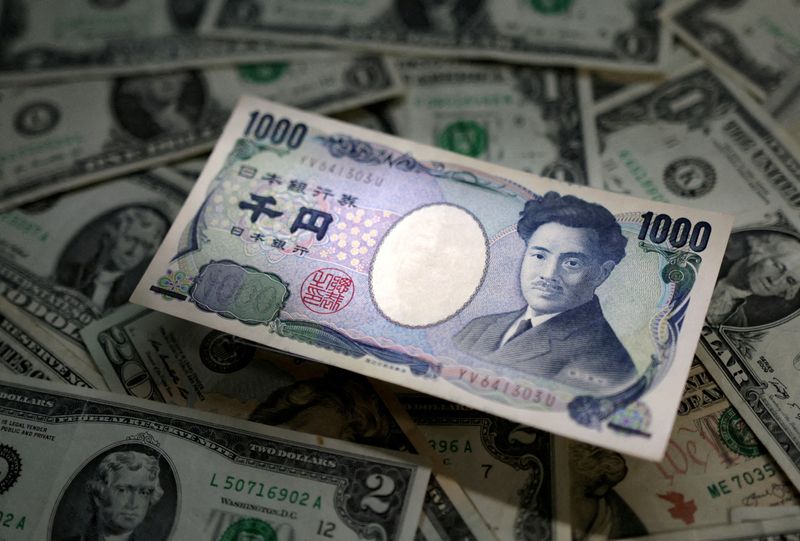By Jamie McGeever
ORLANDO, Florida (Reuters) - Japan's yen-buying currency market intervention may not be sending tremors through the U.S. bond market just yet, but that calm could be disturbed if Tokyo gets drawn into a drawn-out battle to prevent the exchange rate from weakening much further.
Central banks wanting to stop their currencies depreciating too much or too quickly essentially intervene by selling dollar-denominated assets in their international reserves and buying back their own currency with the proceeds.
Experts reckon yen purchases by the Bank of Japan at the behest of the Ministry of Finance are funded by dollar deposits held by the BOJ, which are later replenished by the sale of very short-dated U.S. Treasuries or even bills.
This minimizes the hit to the U.S. bond market - the sale of short-dated notes, especially bills, is more easily absorbed and the long end of the curve, which may be more vulnerable to pockets of illiquidity, remains untouched.
Japan has a pretty deep pool of dollar deposits it can dip into to buy yen, but it is not limitless. If it is drained, bond investors may reasonably wonder whether Japan, the world's largest overseas holder of Treasuries, will turn to selling U.S. bonds.
Estimates suggest Japan could have up to $155 billion in dollar deposits. Japan spent an estimated $35 billion buying yen on Monday, and just over $60 billion in three days in September and October 2022.
Tokyo would likely consider other options to support the yen if need be - steps to encourage repatriation, tighter monetary policy, tapping currency swap lines with the Fed, accessing funds from other sources - before outright U.S. bond sales.
But it's a tail risk.
"Japanese selling (of dollars) is not going to create big pressure in the Treasury market now," notes Shekhar Hari Kumar, macro strategist at Exante Data.
"But in the unlikely event that MoF gets into a protracted fight with FX markets, we might expect some knock on effects on Treasury market yields, especially the 2-5Yr segment with the potential of spillovers to the rest of the curve," he adds.
SHRINKING FOOTPRINT
Japan is the world's largest foreign holder of Treasuries, but its footprint in the Treasuries market is tiny compared to what it once was.
According to Treasury International Capital figures, Japan held $1.17 trillion in U.S. Treasury securities at the end of February. Japan's official international reserves are $1.3 trillion.
These are big numbers, but Japan's presence in the U.S. bond market has greatly diminished over the years. In August 2004, Japan owned 18.2% of all Treasury securities outstanding. That's now barely 4%.
This reflects a broader trend. China once held 14% of all outstanding Treasuries but now holds less than 3%, and foreign central banks' share of all outstanding Treasuries has shrunk to 14% from a record 40% in June 2008.
As Barclays analysts note, foreign central banks used to be the "backbone" of the U.S. bond market, but their appetite for Treasuries has faded as their FX reserves have largely held steady around $12 trillion for the past decade.
Foreign official holdings of U.S. Treasury bonds at the end of February were around $3.5 trillion and holdings of bills stood at $266 billion. The total $3.76 trillion is the lower end of a $3.6 to $4.2 trillion range that has broadly held since 2011.
As the foreign official sector's presence in the U.S. bond market has shrunk, the foreign private sector's has grown. Its share of Treasuries outstanding is now around 17%, the highest in around 15 years.
This is effectively price-insensitive buyers like foreign central banks which "need" to buy government bonds ceding power to price-sensitive investors in the private sector that "chooses" to buy.
It could be problematic for Treasuries, eventually.
"Foreign central banks are unlikely to revert to expanding their FX reserves. If anything, the 'higher for longer' policy rate regime in the US would result in a structurally strong dollar, and emerging market central banks may need to sell Treasuries to defend their currencies from weakening significantly," the analysts wrote on Tuesday.
For it to become a problem, the scale of FX intervention would need to be on another level. That could mean the big Treasuries holders like Japan or China selling in size, or several countries selling at the same time.
Japan's intervention on Monday may have come to around $35 billion. Even if all of it was from selling U.S. bonds, it is still a drop in the $25 trillion Treasury market ocean.
But the dollar is back up near 158 yen and history shows Japanese FX intervention is rarely confined to a single day, so Tokyo may be wading in again soon. Bond investors will be watching.
(The opinions expressed here are those of the author, a columnist for Reuters)
